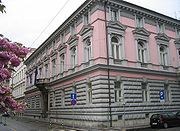
Constitutional Court of Slovenia
Encyclopedia

Slovenian language
Slovene or Slovenian is a South Slavic language spoken by approximately 2.5 million speakers worldwide, the majority of whom live in Slovenia. It is the first language of about 1.85 million people and is one of the 23 official and working languages of the European Union...
: Ustavno sodišče Republike Slovenije, US RS) is a special court established by the Slovenian Constitution
Constitution
A constitution is a set of fundamental principles or established precedents according to which a state or other organization is governed. These rules together make up, i.e. constitute, what the entity is...
. Since its inception, the Court has been located in the city of Ljubljana
Ljubljana
Ljubljana is the capital of Slovenia and its largest city. It is the centre of the City Municipality of Ljubljana. It is located in the centre of the country in the Ljubljana Basin, and is a mid-sized city of some 270,000 inhabitants...
.
Jurisdiction
Most powers of the Constitutional Court are explicitly determined by the Constitution. In accordance with the Constitution, the Constitutional Court decides in particular on the conformity of laws (and other statutory instruments) with the Constitution (and with laws, respectively), on constitutional complaints of violation of human rights and fundamental freedoms by individual acts, on jurisdictional disputes between various state actors, on the unconstitutionality of the acts and activities of political parties, on appeals against a decision of the National Assembly regarding the confirmation of the election of deputies, on the accountability of the President of the Republic, the Prime Minister, and ministers, as well as on the conformity of a treaty with the Constitution in the process of ratifying the treaty.The Constitution determines that also other matters may be vested in the Constitutional Court by laws. In accordance with this provision the Constitutional Court decides, inter alia, on appeals against a National Assembly decision on the election of Slovenian members to the European Parliament, on the admissibility of a National Assembly decision not to call a referendum on the confirmation of constitutional amendments, or on a request of the National Assembly to review the constitutionality of consequences which could occur due to the suspension of the implementation of a law or due to a law not being adopted in a referendum.
Procedures
The Constitutional Court has several strictly defined procedures in which cases may be brought before it.Judges
- Ernest Petrič, president
- Miroslav Mozetič, vice-president
- Marta Klampfer
- Mitja Deisinger
- Jasna Pogačar
- Jan Zobec
- Jože Tratnik
- Jadranka Sovdat
- Etelka Korpič - Horvat
Former judges
- Matevž Krivic
- Peter JambrekPeter JambrekPeter Jambrek is a Slovenian sociologist, jurist, politician and intellectual. He is considered among the fathers of the current Slovenian Constitution and among the most influential public intellectuals in Slovenia....
- Tone Jerovšek
- Lovro ŠturmLovro ŠturmLovro Šturm is a Slovenian jurist and politician. Between 2004 and 2008, he served as the Minister of Justice of Slovenia. He was succeeded by Aleš Zalar.- Biography :...
- Marija Krisper Kramberger
- Franc Grad
- Ciril RibičičCiril RibičičCiril Ribičič is a Slovenian jurist, politician and author. Since 2000, he has served as member of the Constitutional Court of Slovenia....
- Janez Čebulj
- Mirjam Škrk,
- Alojz Janko
- Milojka Modrijan
- Zvonko Fišer
See also
- ConstitutionConstitutionA constitution is a set of fundamental principles or established precedents according to which a state or other organization is governed. These rules together make up, i.e. constitute, what the entity is...
- ConstitutionalismConstitutionalismConstitutionalism has a variety of meanings. Most generally, it is "a complex of ideas, attitudes, and patterns of behavior elaborating the principle that the authority of government derives from and is limited by a body of fundamental law"....
- Constitutional economicsConstitutional economicsConstitutional economics is a research program in economics and constitutionalism that has been described as extending beyond the definition of 'the economic analysis of constitutional law' in explaining the choice "of alternative sets of legal-institutional-constitutional rules that constrain the...
- JurisprudenceJurisprudenceJurisprudence is the theory and philosophy of law. Scholars of jurisprudence, or legal theorists , hope to obtain a deeper understanding of the nature of law, of legal reasoning, legal systems and of legal institutions...
- JudiciaryJudiciaryThe judiciary is the system of courts that interprets and applies the law in the name of the state. The judiciary also provides a mechanism for the resolution of disputes...
- Rule of lawRule of lawThe rule of law, sometimes called supremacy of law, is a legal maxim that says that governmental decisions should be made by applying known principles or laws with minimal discretion in their application...
- Rule According to Higher LawRule according to higher lawThe rule according to a higher law means that no written law may be enforced by the government unless it conforms with certain unwritten, universal principles of fairness, morality, and justice...

